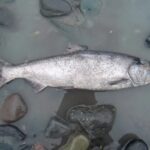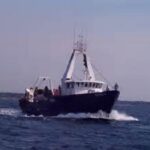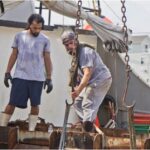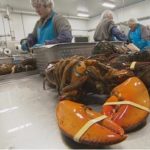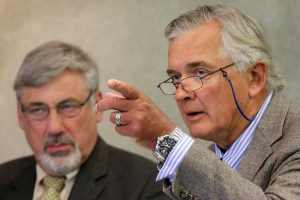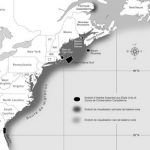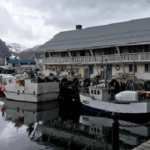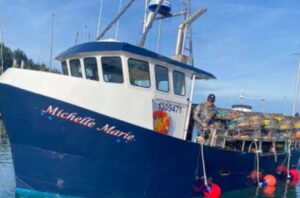Daily Archives: June 29, 2024
Gliders: Scientists add more underwater robots to monitor North Atlantic right whales
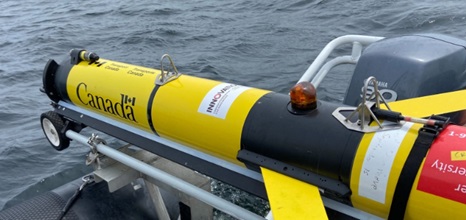 In the race to protect the endangered species, researchers are bringing in more underwater robots—unmanned vehicles known as gliders that slowly patrol the Gulf of St. Lawrence, passively listening for whales. Gliders can stay at sea for months, move far offshore and work in all types of weather. They’re equipped with underwater microphones that scientists use to track the animals. The team added a third glider to its fleet this summer, expanding its ability to monitor whales’ whereabouts by sea and air. It’s collaborative effort involving researchers from University of New Brunswick, Ocean Tracking Network, Transport Canada and Woods Hole Oceanographic. more, >>CLICK TO READ<< 19:37
In the race to protect the endangered species, researchers are bringing in more underwater robots—unmanned vehicles known as gliders that slowly patrol the Gulf of St. Lawrence, passively listening for whales. Gliders can stay at sea for months, move far offshore and work in all types of weather. They’re equipped with underwater microphones that scientists use to track the animals. The team added a third glider to its fleet this summer, expanding its ability to monitor whales’ whereabouts by sea and air. It’s collaborative effort involving researchers from University of New Brunswick, Ocean Tracking Network, Transport Canada and Woods Hole Oceanographic. more, >>CLICK TO READ<< 19:37
Virginia Moves To End 16-Year Ban On Dredging For Crabs During Winter
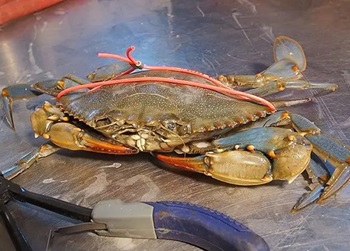 Virginia’s fishery managers have lifted the longstanding ban on dredging for blue crabs during the winter in the Chesapeake Bay, a seismic policy shift that drew strong criticism from their Maryland counterparts and conservationists. The Virginia Marine Resources Commission voted 5–4 on June 25 to repeal the 16-year prohibition on winter dredging. The board is expected to reconvene in September to consider staff recommendations on how to implement the fishery. The new season could open as early as this December. The board’s action came after the VMRC’s Crab Management Advisory Committee, which is mostly made up of industry members, voted 10–2 in favor of reopening the winter season. After that May 29 vote, the agency received 186 public comments on the proposal — all in opposition. more, >>CLICK TO READ<< 16:12
Virginia’s fishery managers have lifted the longstanding ban on dredging for blue crabs during the winter in the Chesapeake Bay, a seismic policy shift that drew strong criticism from their Maryland counterparts and conservationists. The Virginia Marine Resources Commission voted 5–4 on June 25 to repeal the 16-year prohibition on winter dredging. The board is expected to reconvene in September to consider staff recommendations on how to implement the fishery. The new season could open as early as this December. The board’s action came after the VMRC’s Crab Management Advisory Committee, which is mostly made up of industry members, voted 10–2 in favor of reopening the winter season. After that May 29 vote, the agency received 186 public comments on the proposal — all in opposition. more, >>CLICK TO READ<< 16:12
Opinion: The Fisheries Act is crucial to speed disaster relief to American fisheries
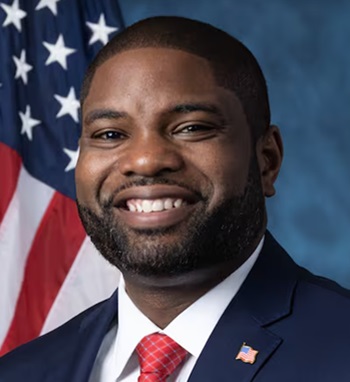 By the time NOAA and OMB finally approve and allocate disaster relief, small businesses and fisheries are already devastated and, in some cases, may have already been forced to close shop. This self-induced, slow-moving bureaucratic process is unacceptable. Overall, the Fishes Act expedites the deployment of federal fishery disaster relief by cutting unnecessary red tape and enacting a 30-day decision requirement for the Office of Management and Budget to either deny or approve a state’s spending plan. What we hope to do with this bill is to throw American fisheries and coastal communities a life raft to stay afloat post-disaster. U.S. fisheries support millions of jobs and bring in billions of dollars to the broader U.S. economy each year. more, >>CLICK TO READ<< 10:17
By the time NOAA and OMB finally approve and allocate disaster relief, small businesses and fisheries are already devastated and, in some cases, may have already been forced to close shop. This self-induced, slow-moving bureaucratic process is unacceptable. Overall, the Fishes Act expedites the deployment of federal fishery disaster relief by cutting unnecessary red tape and enacting a 30-day decision requirement for the Office of Management and Budget to either deny or approve a state’s spending plan. What we hope to do with this bill is to throw American fisheries and coastal communities a life raft to stay afloat post-disaster. U.S. fisheries support millions of jobs and bring in billions of dollars to the broader U.S. economy each year. more, >>CLICK TO READ<< 10:17
How a seagoing mentorship program trains ‘greenhorns’ and changes lives
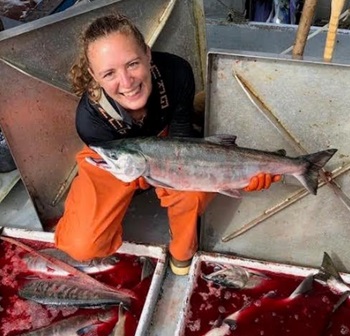 As a student at Vermont’s Middlebury College, Lea LeGardeur loved being on the water. Which proved an asset for LeGardeur, who, after teaching geography at Middlebury, decided to commercial fish in Alaska. LeGardeur’s break came when she discovered the Alaska Longline Fishermen’s Association, or ALFA, based in the small fishing town of Sitka, Alaska. The organization had an extensive record of fighting foreign fishing, trawling and depletion of resources. ALFA had recently secured a grant to fund its Crew Training Program, or CTP. The program was the brainchild of Karl Jordan, who suggested the concept to his father, Eric, shortly after Eric’s wife, Sarah, announced her decision to retire from fishing. Jordan père went on to propose the concept to Linda Behnken, the executive director at ALFA. Photos, Video, more, >>CLICK TO READ<< 07:50
As a student at Vermont’s Middlebury College, Lea LeGardeur loved being on the water. Which proved an asset for LeGardeur, who, after teaching geography at Middlebury, decided to commercial fish in Alaska. LeGardeur’s break came when she discovered the Alaska Longline Fishermen’s Association, or ALFA, based in the small fishing town of Sitka, Alaska. The organization had an extensive record of fighting foreign fishing, trawling and depletion of resources. ALFA had recently secured a grant to fund its Crew Training Program, or CTP. The program was the brainchild of Karl Jordan, who suggested the concept to his father, Eric, shortly after Eric’s wife, Sarah, announced her decision to retire from fishing. Jordan père went on to propose the concept to Linda Behnken, the executive director at ALFA. Photos, Video, more, >>CLICK TO READ<< 07:50
DFO warns Canadian fishers about participating in French halibut fishery
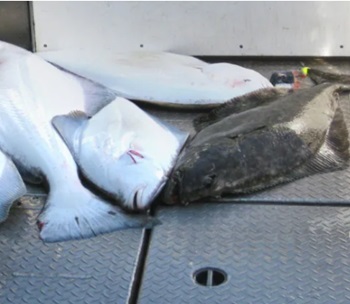 On Friday, Fisheries and Oceans Canada issued a statement saying it has requested formal consultations under the Proces-Verbal to reach an agreement related to quota allocation. The government describes Proces-Verbal as “a treaty that has allowed Canada and France/Saint Pierre and Miquelon to cooperate on the management of fish stocks that are present in our two domestic fishing waters.” The move follows word that a French-flagged ship recently landed 30 tonnes of halibut in Saint Pierre and Miquelon that is believed to be destined for the United States via the Port of Halifax. The fish was caught outside Canada’s 200-mile limit off Newfoundland and Labrador in an area known as the Northwest Atlantic Fisheries Organization Regulatory Area, according to industry sources. more, >>CLICK TO READ<< 06:46
On Friday, Fisheries and Oceans Canada issued a statement saying it has requested formal consultations under the Proces-Verbal to reach an agreement related to quota allocation. The government describes Proces-Verbal as “a treaty that has allowed Canada and France/Saint Pierre and Miquelon to cooperate on the management of fish stocks that are present in our two domestic fishing waters.” The move follows word that a French-flagged ship recently landed 30 tonnes of halibut in Saint Pierre and Miquelon that is believed to be destined for the United States via the Port of Halifax. The fish was caught outside Canada’s 200-mile limit off Newfoundland and Labrador in an area known as the Northwest Atlantic Fisheries Organization Regulatory Area, according to industry sources. more, >>CLICK TO READ<< 06:46

































